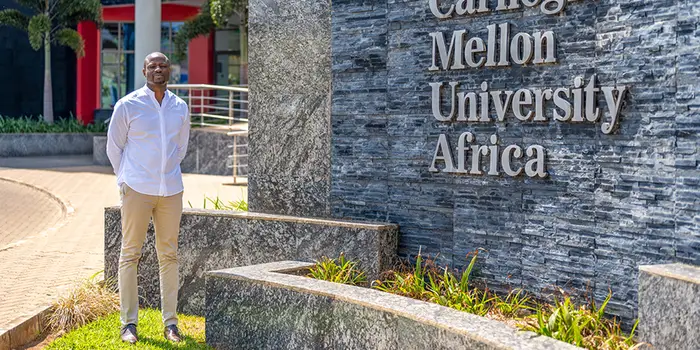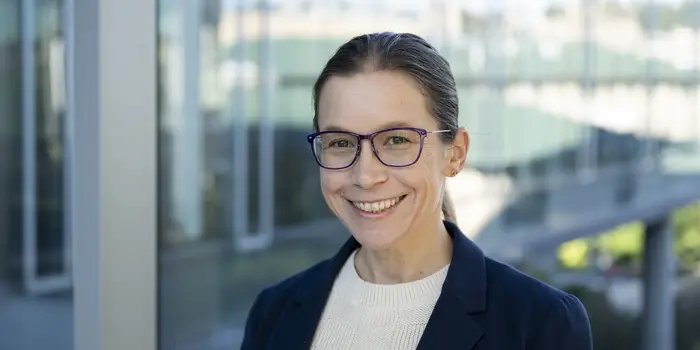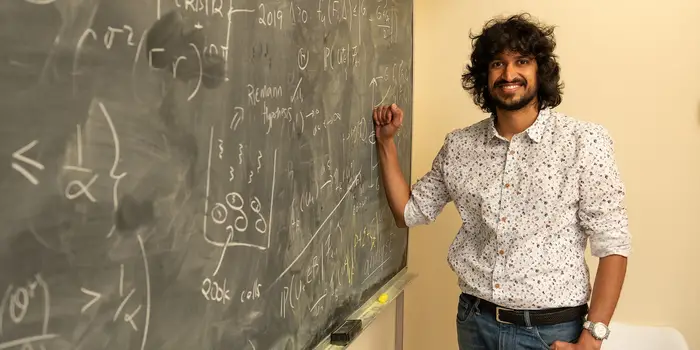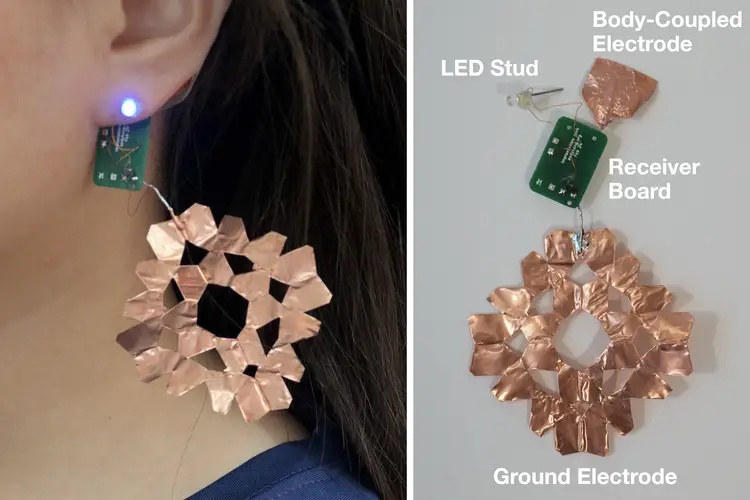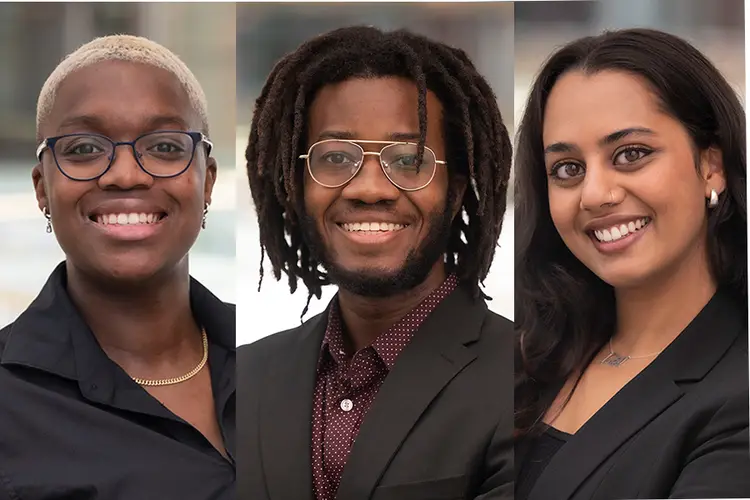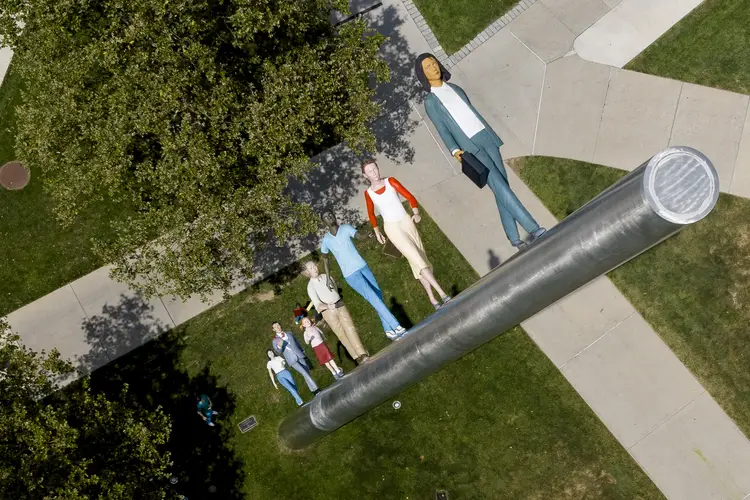CMU Researchers Receive Presidential Early Career Awards
Media Inquiries
By Monica Cooney, Josh Quicksall and Abby Simmons
Carnegie Mellon University's Ismaila Dabo, Claire Le Goues and Aaditya Ramdas are among the recipients of the Presidential Early Career Award for Scientists and Engineers (PECASE), the highest accolade bestowed by the U.S. government on early career scientists and engineers.
Established in 1996, PECASE recognizes outstanding researchers who demonstrate exceptional potential for leadership in their respective fields. This year, President Biden awarded nearly 400 individuals across various disciplines, highlighting the administration's commitment to advancing scientific research and innovation.
Ismaila Dabo
Energy sustainability is a pressing global challenge that requires materials that are capable of efficiently converting and storing energy. Using quantum mechanical models and machine learning methods has accelerated the discovery of materials that can be formulated before they are synthesized for use in technology applications.
Ismaila Dabo(opens in new window) is developing predictive computational capabilities to identify materials for use in efficient energy systems with a focus on hydrogen generation and utilization.
“Receiving this award is an immense honor, for which I thank my supportive family, mentors and colleagues. Materials modeling is instrumental in making strides toward reliable energy access on the African continent and across the world,” said Dabo, a professor of materials science.
Dabo joined the Department of Materials Science and Engineering(opens in new window) faculty in fall 2024, spending the last semester teaching at Carnegie Mellon University in Africa(opens in new window), and now will spend a semester in Pittsburgh, while also maintaining close contact with program partners in Kigali.
“Developing sustainable energy is a challenge, particularly in Africa where supply is an issue,” said Dabo. “By creating models to expedite the implementation of new materials, we aim to improve access, reduce carbon emissions and improve mineral extraction processes.”
In addition to the PECASE award, Dabo has garnered numerous recognitions for his teaching and research, including the Wilson Teaching Excellence Award, Montgomery-Mitchell Teaching Innovation Award, Corning Chair in Materials Science and Engineering, and a National Science Foundation CAREER Award.
Claire Le Goues
In a landscape where software failures can cascade into billion-dollar debacles, Claire Le Goues(opens in new window) has been pursuing an audacious goal: teaching software to fix itself.
Le Goues, a professor in CMU's Software and Societal Systems Department(opens in new window) (S3D), has been redefining the boundaries of software reliability since her graduate work at the University of Virginia. There, she developed GenProg, a pioneering system that applies principles from evolutionary biology to software repair. Like natural selection's iterative process of testing countless variations until beneficial traits emerge, GenProg generates and evaluates thousands of potential code fixes, learning from each attempt to incrementally evolve solutions to complex software bugs.
"Traditional debugging is like searching for a needle in a haystack — except that the haystack is infinite," Le Goues explained. "GenProg turns that challenge into an evolutionary process, systematically exploring possibilities until it discovers and repairs that work."
This innovative approach helped catalyze significant growth in the field of automated software repair. Now at CMU's squaresLab, Le Goues and her team are pushing these boundaries further, developing sophisticated techniques for maintaining and verifying complex software systems.
"Claire's work exemplifies what makes S3D unique," said Nicolas Christin(opens in new window), department head of S3D. "She's taking fundamental computer science concepts and transforming them into practical solutions that address urgent challenges in software quality and reliability. This work has implications across every sector.”
The significance of this research becomes clear when considering its applications to mission-critical systems — from emergency response infrastructure to potentially even precision agriculture — where reliability is paramount. Le Goues' work on automated repair techniques has also contributed to the development of crucial evaluation frameworks, advancing how researchers assess and validate software repair methods.
"Software has become the invisible infrastructure of modern life," Le Goues noted. "From supply chain logistics to climate modeling systems, our society depends on code working correctly. Our research aims to ensure that dependency isn't misplaced."
Le Goues joined Carnegie Mellon's faculty in 2013 after completing her Ph.D. in Computer Science at the University of Virginia. Her pioneering contributions to software engineering have earned numerous accolades, including the NSF CAREER Award and the ACM SIGSOFT Early Career Researcher Award."
Aaditya Ramdas
Aaditya Ramdas(opens in new window) aims to bridge the theory and practice of statistics, data science, machine learning and artificial intelligence, by designing algorithms with rigorous mathematical guarantees that also work excellently in practice.
“Many parts of classical statistics can be quite rigid, disallowing peeking at your data as you collect it, or making adaptive decisions based on that data,” Ramdas said. “My work develops tools for sequential, anytime-valid inference (SAVI). Apart from the savvy abbreviation, my tools enable scientists to seamlessly move between data collection, analysis, decision making and experimentation, all while enabling rigorously correct statistical inference.”
Ramdas’ work has had applications in the IT industry, and in areas like privacy, neuroscience, genetics, auditing and scientific reproducibility.
“Aaditya often demonstrates a preternatural ability to see clearly through to the crux of a research problem and to develop technical solutions that can be applied to a wide range of scenarios, and his work on sequential, anytime-valid inference is no exception,” said Rebecca Nugent(opens in new window), Fienberg Professor and head of the Department of Statistics & Data Science(opens in new window). “Academics and real-world practitioners alike will be able to redesign experiments to more efficiently collect and analyze their data, generating reproducible results — something that all fields will benefit from.”
Ramdas, an associate professor with joint appointments in the Statistics & Data Science and Machine Learning departments, has made significant contributions to his field. In 2024, he received the National Academy of Sciences Kavli Fellowship and the Sloan Research Fellowship in Mathematics. He previously received the National Science Foundation's CAREER Award, and other early career honors from the Institute of Mathematical Statistics, the Committee of Presidents of Statistical Societies and the Bernoulli Society.
Ramdas completed his Ph.D. in statistics and machine learning at Carnegie Mellon in 2015, followed by a postdoctoral fellowship at the University of California, Berkeley. He joined Carnegie Mellon’s faculty in 2018.
